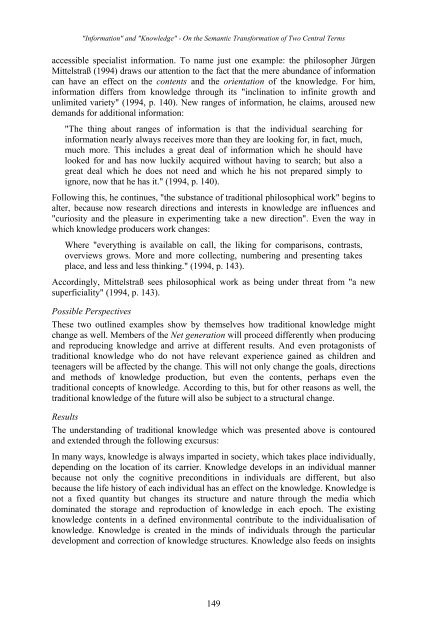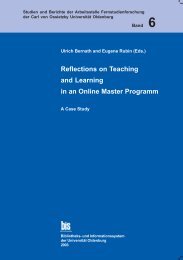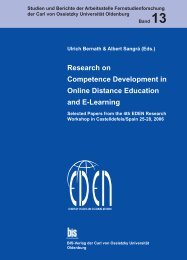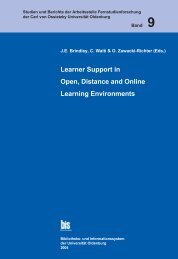Distance Education in Transition - Master of Distance Education ...
Distance Education in Transition - Master of Distance Education ...
Distance Education in Transition - Master of Distance Education ...
You also want an ePaper? Increase the reach of your titles
YUMPU automatically turns print PDFs into web optimized ePapers that Google loves.
"Information" and "Knowledge" - On the Semantic Transformation <strong>of</strong> Two Central Terms<br />
accessible specialist <strong>in</strong>formation. To name just one example: the philosopher Jürgen<br />
Mittelstraß (1994) draws our attention to the fact that the mere abundance <strong>of</strong> <strong>in</strong>formation<br />
can have an effect on the contents and the orientation <strong>of</strong> the knowledge. For him,<br />
<strong>in</strong>formation differs from knowledge through its "<strong>in</strong>cl<strong>in</strong>ation to <strong>in</strong>f<strong>in</strong>ite growth and<br />
unlimited variety" (1994, p. 140). New ranges <strong>of</strong> <strong>in</strong>formation, he claims, aroused new<br />
demands for additional <strong>in</strong>formation:<br />
"The th<strong>in</strong>g about ranges <strong>of</strong> <strong>in</strong>formation is that the <strong>in</strong>dividual search<strong>in</strong>g for<br />
<strong>in</strong>formation nearly always receives more than they are look<strong>in</strong>g for, <strong>in</strong> fact, much,<br />
much more. This <strong>in</strong>cludes a great deal <strong>of</strong> <strong>in</strong>formation which he should have<br />
looked for and has now luckily acquired without hav<strong>in</strong>g to search; but also a<br />
great deal which he does not need and which he his not prepared simply to<br />
ignore, now that he has it." (1994, p. 140).<br />
Follow<strong>in</strong>g this, he cont<strong>in</strong>ues, "the substance <strong>of</strong> traditional philosophical work" beg<strong>in</strong>s to<br />
alter, because now research directions and <strong>in</strong>terests <strong>in</strong> knowledge are <strong>in</strong>fluences and<br />
"curiosity and the pleasure <strong>in</strong> experiment<strong>in</strong>g take a new direction". Even the way <strong>in</strong><br />
which knowledge producers work changes:<br />
Where "everyth<strong>in</strong>g is available on call, the lik<strong>in</strong>g for comparisons, contrasts,<br />
overviews grows. More and more collect<strong>in</strong>g, number<strong>in</strong>g and present<strong>in</strong>g takes<br />
place, and less and less th<strong>in</strong>k<strong>in</strong>g." (1994, p. 143).<br />
Accord<strong>in</strong>gly, Mittelstraß sees philosophical work as be<strong>in</strong>g under threat from "a new<br />
superficiality" (1994, p. 143).<br />
Possible Perspectives<br />
These two outl<strong>in</strong>ed examples show by themselves how traditional knowledge might<br />
change as well. Members <strong>of</strong> the Net generation will proceed differently when produc<strong>in</strong>g<br />
and reproduc<strong>in</strong>g knowledge and arrive at different results. And even protagonists <strong>of</strong><br />
traditional knowledge who do not have relevant experience ga<strong>in</strong>ed as children and<br />
teenagers will be affected by the change. This will not only change the goals, directions<br />
and methods <strong>of</strong> knowledge production, but even the contents, perhaps even the<br />
traditional concepts <strong>of</strong> knowledge. Accord<strong>in</strong>g to this, but for other reasons as well, the<br />
traditional knowledge <strong>of</strong> the future will also be subject to a structural change.<br />
Results<br />
The understand<strong>in</strong>g <strong>of</strong> traditional knowledge which was presented above is contoured<br />
and extended through the follow<strong>in</strong>g excursus:<br />
In many ways, knowledge is always imparted <strong>in</strong> society, which takes place <strong>in</strong>dividually,<br />
depend<strong>in</strong>g on the location <strong>of</strong> its carrier. Knowledge develops <strong>in</strong> an <strong>in</strong>dividual manner<br />
because not only the cognitive preconditions <strong>in</strong> <strong>in</strong>dividuals are different, but also<br />
because the life history <strong>of</strong> each <strong>in</strong>dividual has an effect on the knowledge. Knowledge is<br />
not a fixed quantity but changes its structure and nature through the media which<br />
dom<strong>in</strong>ated the storage and reproduction <strong>of</strong> knowledge <strong>in</strong> each epoch. The exist<strong>in</strong>g<br />
knowledge contents <strong>in</strong> a def<strong>in</strong>ed environmental contribute to the <strong>in</strong>dividualisation <strong>of</strong><br />
knowledge. Knowledge is created <strong>in</strong> the m<strong>in</strong>ds <strong>of</strong> <strong>in</strong>dividuals through the particular<br />
development and correction <strong>of</strong> knowledge structures. Knowledge also feeds on <strong>in</strong>sights<br />
149





